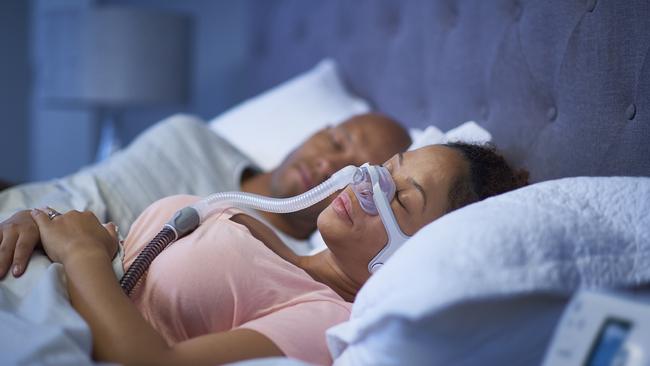ResMed and other medical device makers face Russia, Ukraine hit over semiconductors
Russia’s invasion of Ukraine is threatening to derail the production of medical devices ranging from pacemakers to sleep apnoea machines.

Russia’s invasion of Ukraine is threatening to derail the production of a range of medical devices from pacemakers to sleep apnoea machines, as the war exacerbates a global semiconductor shortage.
A supply chain crunch of the essential computer chips has already plagued the automotive industry, blowing out wait times for some new cars beyond six months. Now the healthcare sector is facing a similar crisis, potentially disrupting production at companies such as ASX-listed sleep apnoea machine maker ResMed and triggering price rises.
Production of vital raw materials for the silicon chips — which are key components in essential healthcare devices including MRI machines, pacemakers and blood-sugar monitors for diabetes — are concentrated in Russia and Ukraine.
About half the world’s supply of neon gas, which is used to fuel the lasers that print circuitry on semiconductors, is produced in Ukraine. And more than 30 per cent of the world’s palladium — which is used in the later manufacturing stages of semiconductors — comes from Russia.
Chip makers have been stockpiling raw materials in an effort to counter Covid-19 and other disruptions. Meanwhile, companies, including ResMed, have been broadening their supplier base, meaning any shortage from war in Ukraine is unlikely to eventuate for at least the next six months.
But analysts are already factoring in potential disruption.
“Ukraine accounts for a significant portion of the world’s neon gas output and, as such, supply shortages are likely to dent further already pandemic-disrupted supply lines and lead to price hikes. To this point, we note that when Russia invaded Crimea in 2014, neon prices shot up by at least 600 per cent,” Jarden analyst Steve Wheen said.
“On the flip side, you’ve seen sanctions brought in from the US against providing semiconductors to Russia. You’ve also seen sanctions from Japan and Taiwan. So maybe we have some potential here for semiconductor chips to be redirected towards perhaps the healthcare sector.”
At the same time, a report from the Semiconductor Industry Association and Boston Consulting Group has forecast that China — which before the Ukraine war declared a “no limits” partnership with Russia — will fully dominate chip production by 2030, as Beijing ploughs $US100bn of subsidies into the industry.
Meanwhile, chip manufacturing in the US has fallen from accounting for 37 per cent of the world’s supply in 1990 to 12 per cent, making it more reliant on Chinese and Asian imports, which can cost half the price to produce.
“Incentives are needed to strengthen our defence industrial base and provide domestic capabilities in chip fabrication to satisfy America’s national security needs,” the BCG report said.
“Establishing onshore capabilities to produce microelectronics for national security and critical infrastructure would improve the resiliency of our supply chains and rebalance the military’s current reliance on offshore production.”
But not all semiconductors use neon gas, clouding analyst estimates.
“Without knowing which semiconductors chips are used in ResMed devices, it is difficult to quantify the impact on ResMed but we call out risk on the downside should the Russian/military conflict impact ResMed supply lines,” Mr Wheen said.
But Bernstein analyst Stacy Rasgon said even if neon prices rose 10-fold, it would represent a fraction of the industry’s cost structure. The semiconductor-grade neon industry is estimated to be worth around $US100m a year, compared with global revenues for chips of above $US500bn.
It comes as a pandemic-induced supply chain crunch has limiting a windfall of up to $US350m ($486.5m) that ResMed was expected to reap from rival Philip’s product recall.
Overall, ResMed reported a 16 per cent revenue lift to $US1.8bn in the six months to December 31, while net profit jumped 13 per cent to $US405.4m. In the past year, its shares have soared 38.2 per cent to $33.31.
“The next issue for Resmed is its supply chain issues around access to semiconductors, and this is really difficult to get to the bottom of but so far the three channel checks that I did are all seeing signs that ResMed are starting to mobilise products and shipping more product this quarter, the March quarter, than they did in December quarter,” Mr Wheen said.
“It’s very consistent that there is an expectation that when we get to the fourth quarter, there is a quantum leap in volume that will come out of Resmed.
“Now, we’ve got to overlay that with the war and what’s going on in the Ukraine. It probably wouldn’t affect ResMed based on what they’ve been able to secure so far, for the next six to 12 months. But we can’t say for certain there will be a straight line recovery from the fourth quarter onwards. I think we could just say this quarter and next quarter we have some confidence that they’re going to be posting some pretty impressive numbers.”
At ResMed’s latest quarterly results in January, chief executive Mick Farrell said: “Our global ResMed team continues to find ways to deliver products and solutions to our customers, even amid ongoing supply chain challenges that have limited additional access to critical electronic components”.
“We are working every day to meet the extraordinary demand generated by our competitor’s ongoing device recall. We continue to ensure priority for the highest-need patients first, and we are working with physicians, providers, and healthcare systems to maintain delivery of medical devices and digital health solutions for the patients who need care.”




To join the conversation, please log in. Don't have an account? Register
Join the conversation, you are commenting as Logout